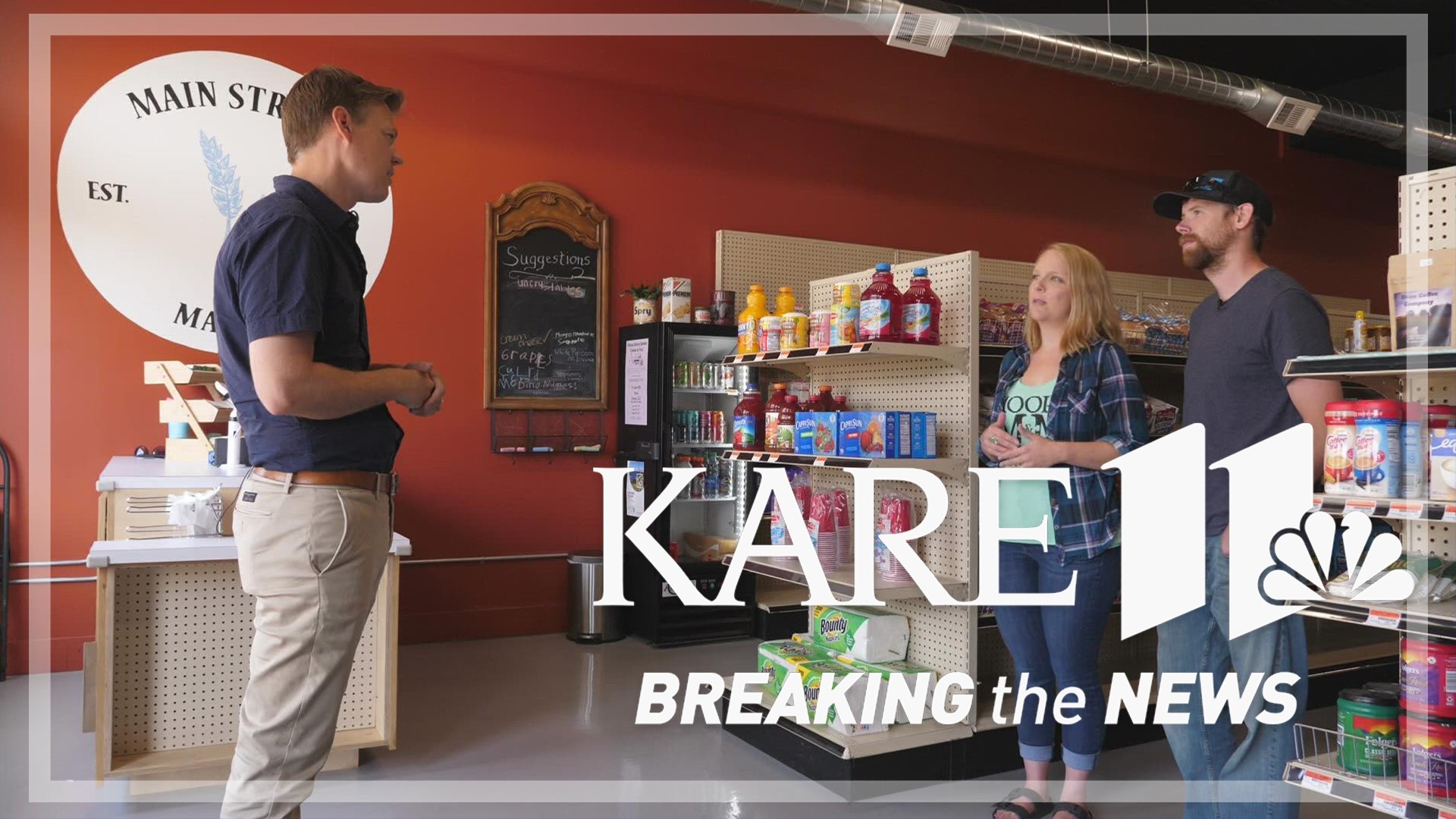EVANSVILLE, Minn. — A self-service grocery store in rural Minnesota is doing way more with less, and it's catching on with customers, while also catching the eye of other communities.
In a small town with limited resources, Evansville's Main Street Market has limited its staffed hours to just three days a week for the general public.
But for members, there's unlimited access with the tap of a key fob or cell phone.
"I have an app on my phone and all I do is touch it to here and it unlocks the door," said Deb Evavold, who is among dozens of people who paid $75 for an annual membership. There are also three and six month membership options.
Once inside, customers can also use their phones to scan items and check out in the aisle, or walk up to a self-service kiosk.
Dan Evavold's family owns the hardware store next door. He appreciates his new neighbors, even though he hardly sees them.
"It's just so handy for me," Dan Evavold said. "I mean, I don't have to drive 20, 30, 40, 50 miles to buy a loaf of bread or a can of soup. I can just walk next door."
The self-service grocery store is the work of Caileen and Alex Ostenson.
Caileen Ostenson: "The grocery store that was in town closed up a few years back, and Alex came to me one day and said, 'We need to open a grocery store in Evansville.'"
Kent Erdahl: "Did you have experience opening grocery stores in small towns?"
Alex Ostenson: "No, actually, my background is in diesel mechanics, but my strong suit is problem solving."
Kent Erdahl: "So how did you land on this type of model? This isn't something that's happening in small towns. Amazon is doing this type of stuff in big cities."
Alex Ostenson: "For a small community it's really tough to either be able to staff it seven days a week, or for the owners to staff it. We just didn't see that as a very sustainable model going forward."
Instead, they built a pilot store focused on stocking the essentials. They embraced the latest technology to help provide a secure, self-service experience, while also adding some old school touches like a chalkboard for recommendations. It's all aimed at a singular goal, serving their community members when it works best for them.
Alex Ostenson: "In our community, we have a lot of people who commute for work. They commute to Alexandria or elsewhere, so they don't get home until 6:00 at night, until after those traditional hours, so it really opens up access to more people."
Kent Erdahl: "People might be wondering about theft."
Caileen Ostenson: "That's usually the first question that's asked."
Alex Ostenson: "Thanks to the cameras and automation, we know who is coming and going. We know our door log, we know exactly who is coming in. We know exactly who is checking out and what they're getting. So if we ever have any question, it's pretty easy to narrow it down."
The concept is certainly catching on. The Main Street Market has grown from 50 to 120 monthly members in the last year. The products they carry has also grown to include local coffee, honey and even seasonal flowers and produce from neighbors.
"It's been a neat way to help kind of be a support to others," Caileen Ostenson said. "And lets us give some extra stuff back to the community that way too."
And because they save money on staffing, prices are more competitive than most expect.
"We really want to try to break the stereotype of, 'Oh, it's a small town grocery. It has to be crazy expensive,'" Caileen Ostenson said.
And at a time when so many others are burning out and closing down, the Ostensons are breaking ownership stereotypes too.
"We have two kids and they keep us pretty busy," Caileen Ostenson said. "So we were looking at how we could make this more sustainable, for one, but also to have a good work/life balance."
Anyone who is interested in checking out the store (without paying for a membership) can still access the Main Street Market during normal business hours on Tuesdays, Thursdays and Saturdays.
It's a concept that has other communities, and state leaders, taking notice.
"I think it's a fabulous idea," said Kathy Draeger, statewide director for the University of Minnesota Regional Sustainable Development Partnerships. "I love that they're testing this out in Evansville, and that maybe they're creating a replicable model."
Draeger says that kind of model could prove critical to rural owners who are climbing in age and have been struggling to keep serving their communities for years now.
"Our 2020 survey found that about 40% had hoped to transition out of business ownership within the next five years," Draeger said. "Yet 80% of those stores do not have transition plans."
The self-service model could be coming to other Main Streets across Minnesota soon. The Ostensons say they have consulted with other store owners who are looking for help making a similar switch. They have also had conversations about opening a second, bigger store in a different Minnesota community.
Watch more Breaking The News:
Watch all of the latest stories from Breaking The News in our YouTube playlist:

